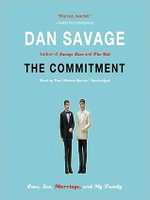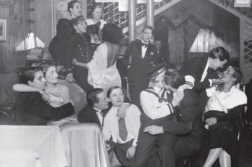 The Commitment: Love, Sex, Marriage, and My Family
The Commitment: Love, Sex, Marriage, and My Family
by Dan Savage
Dutton. 293 pages, $24.95
ANYONE WHO’S FAMILIAR with his widely syndicated sex-advice column, “Savage Love,” may think Dan Savage an unlikely contributor to the serious, ongoing debate over same-sex marriage. But regular readers are aware that Savage has been partnered for ten years with his boyfriend Terry, with whom he adopted their son D.J., who’s now six years old. Savage recounted that tale in his award-winning memoir The Kid. His new book, The Commitment: Love, Sex, Marriage, and My Family, looks back over the evolution of his relationship and contemplates from various angles the topic that may be this decade’s most heated and divisive one.
The cast of characters includes not only future metal-head skateboarder D.J. and stay-at-home dad Terry, who initially doesn’t want to get married “like straight people,” but also Savage’s extended family, who provide plenty of comedy. His professor-bartender brother prefers non-cohabiting girlfriends and had a vasectomy at age twenty to avoid ever having children, proof that marriage and children aren’t necessarily what all straight people want. His outspoken mother ends up being the staunchest supporter of gay marriage, urging Dan and Terry to tie the knot every chance she gets, inundating them with pertinent newspaper articles that come in little envelopes bearing a return address that reads only “The Mad Clipper.”
But Savage also enters the war of words and articulately debunks many of the Right’s spurious defenses of “traditional” marriage. Why, for instance, do Christian fundamentalists insist that the purpose of marriage is procreation, when religious wedding vows include nothing at all about having or raising children? Why are some gay couples attacked for being sexually non-exclusive, when many heterosexual marriages fail precisely because of their sexual limitations? Savage gives the example of two friends, a young couple whose divorce was precipitated by the husband’s rejection of his wife’s desire to experience a “conservative, stabilizing” threesome: “A little non-monogamy could have saved their marriage, I’m convinced, but they can’t conceive of being married without being sexually exclusive. It’s too bad for their three traumatized little girls that their parents aren’t gay men, isn’t it?”
Interestingly, despite his frankness about sexual matters here and in his advice column, Savage refers to himself several times as conservative. Raised in a sprawling Irish Catholic family in Chicago, he sees himself as being more faithful to “traditional family values” than any of his siblings. While his sometimes arch, acerbic writing persona doesn’t mesh neatly with that self-analysis, and while he places a bit too much trust in “liberal” and “conservative” as stable descriptors rather than shifting cultural constructions, he argues effectively and disarmingly from somewhere between those two perceived categories.
When Savage isn’t taking shots at his political opponents, he takes time to show off his more impressive skills, stepping back to give his story some requisite narrative distance. And the picture often becomes richer, revealingly, when he removes himself from the center of the frame. Several characters that he presents could be deserving of entire books themselves: his grandmother who aspired to be a doctor but instead found herself trapped in a sparkless marriage, the young homeless woman who gave birth to D.J. before returning to the streets, even the wholesome straight guy who approached Savage during a college lecture tour and wound up kneeling naked in Savage’s hotel-room bathtub, thrilled that he’d finally found someone to fulfill his fetish-fantasy of having cake smashed in his face.
As for the book’s clever surprise ending (be sure to read past the acknowledgments and “About the Author” page), let’s just say that the final scenes are both unexpectedly moving and totally hilarious. What Savage doesn’t acknowledge quite as much as he might, though he also clearly understands this, is that marriage vows of any sort represent a romantic and social ideal. Isn’t that part of what makes them so seductively, legally binding? Throughout his book, Savage cites the statistical reality that half of American marriages today end in divorce. But after finishing The Commitment, readers of all sexual and political stripes will be persuaded to wish Dan Savage and his husband the best in living up to the ideal.
Jason Roush, author of a recently published book of poetry, After Hours, teaches at Emerson College.





